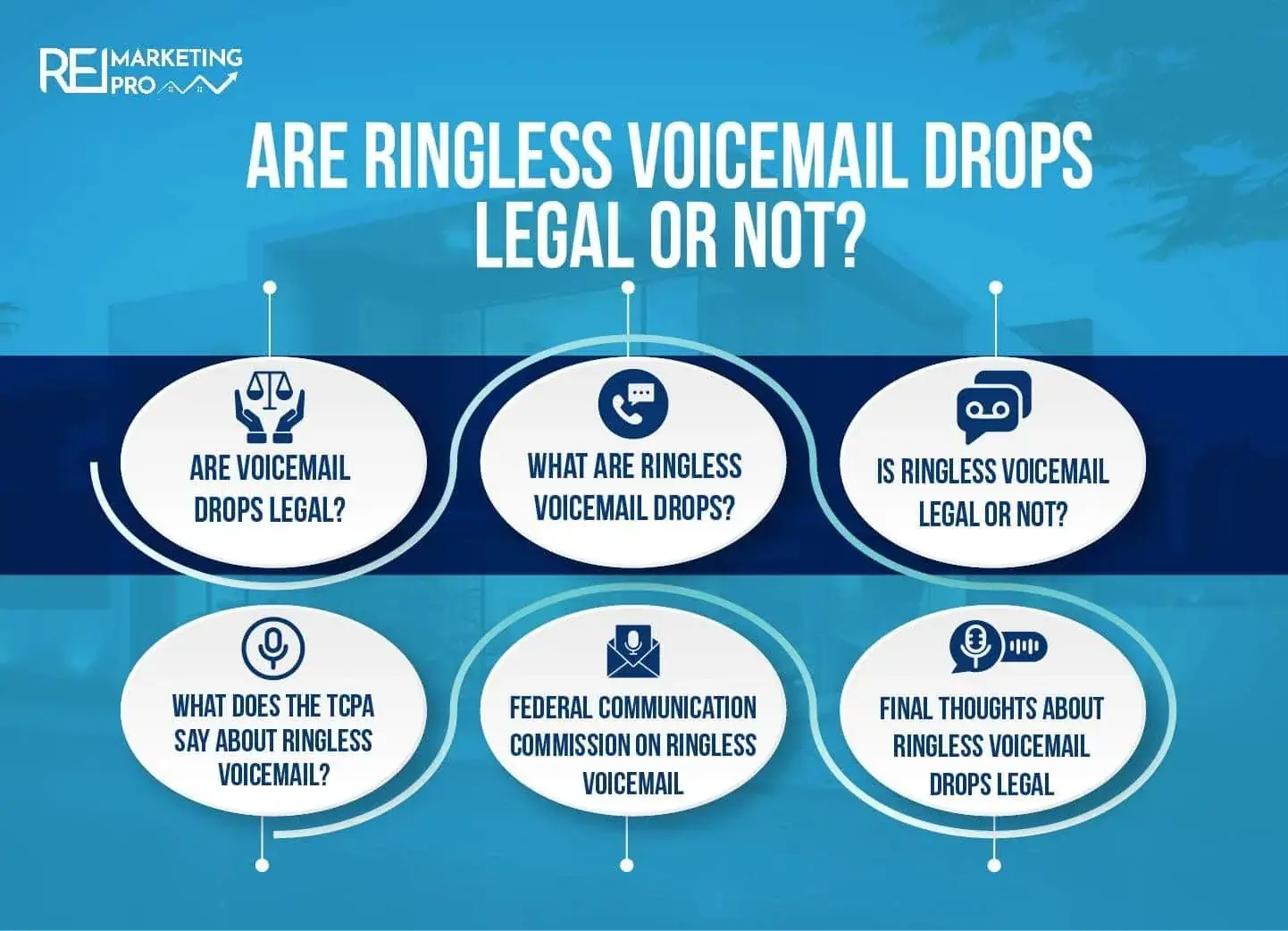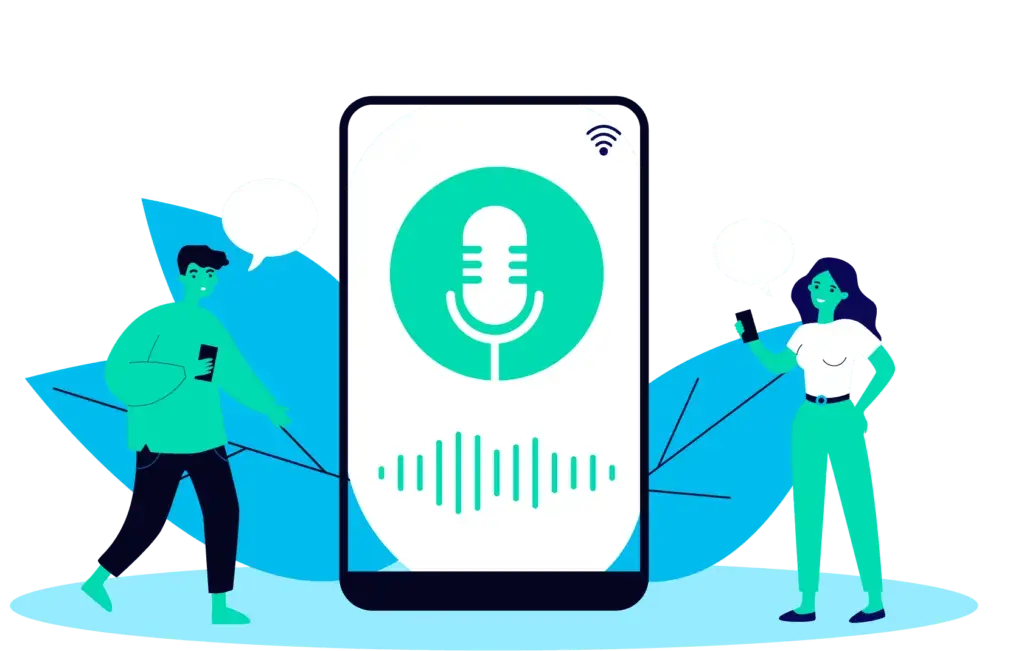Home » Are Ringless Voicemail Drops Legal or Not?
Are Ringless Voicemail Drops Legal or Not?
Are Voicemail Drops Legal?
Ringless voicemail drops have become popular in recent years due to telemarketers, debt creditors, and real estate wholesalers dropping pre-recorded voice messages into recipients’ voicemail inboxes without causing their telephones to ring. This technology has generated different reactions and complaints from clients, with some viewing it as an invasion of privacy and others having no problem with it.
The legality of ringless voicemail is an arguable problem with differing opinions and no clear instructions from official regulatory bodies like the Federal Communications Commission (FCC). REI Marketing Pro will explore ringless voicemail, how it works, is ringless voicemail legal, and the current regulatory system.

What Are Ringless Voicemail Drops?
Ringless voicemail drop is a pre-recorded voice message directly sent into someone’s voicemail inbox without affecting their telephone’s ability to ring or offering any sort of notification that a call has been received. This allows real estate investors to deliver voicemail messages without setting up a traditional phone call.
A Ringless voicemail platform like Slyboardcast, Click Send, and Smarter Contact utilizes unique laptop-based dialing technology that recognizes when voicemail systems have picked up. After that, these tools send a pre-recorded audio file message to the person’s voicemail box. This all occurs in seconds without causing the recipient’s phone to make a sound.
Related Post: What Is The Success Rate of Ringless Voicemails?
Is Ringless Voicemail Legal or Not?
The legality of ringless voicemail is in a gray area without a definitive answer. Multiple lawsuits are available regarding the voicemail drops legality, with conflicting rulings from courts and differing legal interpretations from professional regulatory bodies like the FCC.

Supporters of ringless voicemail argue that it is legal because it does not represent a “call” underneath the definitions of the Telephone Consumer Protection Act (TCPA), which is the primary law regulating telemarketing practices inside the United States. Since a ringless voicemail drop no longer motivates the recipient’s cellphone to ring and create a transmitted audible voice factor, the argument is that it does not meet the legal criteria of a call or violates do-not-call guidelines.
Opponents argue that ringless voicemail still represents an unwanted attempt to contact clients without their consent and approval. They view it as a way for companies to bypass and avoid consumer protection laws by exploiting criminal loopholes related to the technical information of the way calls are described.
What Does The TCPA Say About Ringless Voicemail?
The Telephone Consumer Protection Act (TCPA) is a federal law that was passed in 1991 to restrict uninvited telemarketing practices and cover consumer privacy rights. Some key things the TCPA restricts and regulates include:
- Prohibiting the use of automatic telephone dialing systems (ATDS) to call or send texts to mobile telephones without consent
- Restrict prerecorded or artificial voice messages
- Companies should maintain an internal do-not-call list
- Requiring caller ID records to be displayed
Ringless voicemail supporters say it doesn’t meet the definition of a call under the law because no audible ringing is transmitted to the recipient’s smartphone. Supporters express that ringless voicemail drop is a way to transfer data from a voicemail repository and not an actual phone “call,” as defined by the TCPA.
Federal Communication Commission on Ringless Voicemail

The FCC is the government organization accountable for implementing telecommunications laws just like the TCPA. It has also not made any specific regulations regarding Ringless Voicemails (RVM).
However, the FCC also mentioned in the same report that the legality of ringless voicemail would require additional research and attention to statements from the public. As of mid-2023, the FCC has not issued a report to classify ringless voicemail as legal or illegal under the laws it governs.
Final Thoughts About Ringless Voicemail Drops Legal
Ringless voicemail offers cost-effective opportunities for real estate investors trying to directly contact customers and prospects. The technology exists in a legal gray place that lacks definitive regulatory guidance and consensus. We would advise businesses to get proper consent from prospects under the TCPA before executing RVM campaigns.
How a Ringless Voicemail Drop Appears on a Phone?
When you receive a ringless voicemail drop on your phone, it honestly shows up as a brand-new voicemail message in your inbox. There is no record of a missed call, and your cellphone does not make any ringtone sound or vibration.
How Ringless Voicemail Works?

Zeeshan S.
Most Popular
Is Real Estate Wholesaling Worth It in 2026
How to Use CRM Systems to Organize Real Estate Wholesaling Leads
Is SMS Marketing Illegal for Real Estate Investors? What You Need to Know
Daily/Weekly Reporting
24/7 Available
